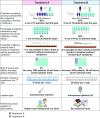Patient and Physician Preferences for Therapy Characteristics for Psoriasis: A Discrete Choice Experiment in Japan
- PMID: 30377992
- PMCID: PMC6533353
- DOI: 10.1007/s41669-018-0104-1
Patient and Physician Preferences for Therapy Characteristics for Psoriasis: A Discrete Choice Experiment in Japan
Abstract
Background: With progress being made in the treatment of psoriasis, a variety of clinical research and treatment options are being pursued. This study used a discrete choice experiment (DCE) to estimate treatment characteristic preferences for both patients and physicians in Japan. Subgroup analysis was also applied in order to examine differences within the range of patients and within the range of physicians.
Methods: The DCE was developed with the input of clinical experts in the treatment of psoriasis to ensure inclusion of the most relevant attributes at appropriate levels in a way that is understandable to both physicians and patients. The study was conducted on parallel samples of Japanese physicians (n = 161) and Japanese psoriasis patients (n = 306) through an online panel. For each sample, a conditional logit statistical model and subgroup analysis were then performed to estimate respondent preferences for treatment attributes.
Results: The overall findings are that better treatment efficacy as measured by proportion of patients achieving 90% reduction in the Psoriasis Area and Severity Index score (PASI 90), lower risk of adverse events and the availability of a bio-holiday are important decision factors for both patients and physicians. Low injection frequency is less of a priority for both samples. Also, while both groups demonstrate a preference to receive the treatment injections at a clinic by a healthcare professional rather than self-injection at home, this is more pronounced for the patient sample. The physician sample shows considerably more emphasis on the type of injection, though both samples prefer subcutaneous injections to intravenous injections.
Implications: This study reveals the importance of addressing both clinical effectiveness and process factors in systemic, non-topical psoriasis treatments to gain acceptance by both physicians and patients. As well as efficacy (as measured by PASI 90), which remains a consistent priority in treatment, administration and development of new treatments should also consider process factors such as the mode of administration and possibility for a bio-holiday.
Conflict of interest statement
TB has no conflicts of interest. HK is an employee of Janssen Pharmaceutical. JM is an employee of Janssen Pharmaceutical.
Figures
Similar articles
-
Relative Importance of Mode of Administration in Treatment Preferences among Plaque Psoriasis Patients in the United States.J Health Econ Outcomes Res. 2016 Aug 10;4(2):141-157. doi: 10.36469/9817. eCollection 2017. J Health Econ Outcomes Res. 2016. PMID: 37661952 Free PMC article.
-
The importance of understanding patient and physician preferences for psoriasis treatment characteristics: a systematic review of discrete-choice experiments.Curr Med Res Opin. 2020 Aug;36(8):1257-1275. doi: 10.1080/03007995.2020.1776233. Epub 2020 Jul 1. Curr Med Res Opin. 2020. PMID: 32468865
-
A discrete choice experiment on oral and injection treatment preferences among moderate-to-severe psoriasis patients in Japan.J Dermatol. 2023 Jun;50(6):766-777. doi: 10.1111/1346-8138.16746. Epub 2023 Feb 20. J Dermatol. 2023. PMID: 36808765
-
Hematologists' Preferences for First-line Therapy Characteristics for Multiple Myeloma in Japan: Attribute Rating and Discrete Choice Experiment.Clin Ther. 2018 Feb;40(2):296-308.e2. doi: 10.1016/j.clinthera.2017.12.012. Epub 2018 Feb 1. Clin Ther. 2018. PMID: 29358004
-
Comparative effects of biological therapies on the severity of skin symptoms and health-related quality of life in patients with plaque-type psoriasis: a meta-analysis.Curr Med Res Opin. 2008 May;24(5):1237-54. doi: 10.1185/030079908x291985. Epub 2008 Mar 19. Curr Med Res Opin. 2008. PMID: 18355421 Review.
Cited by
-
Patient-centred Preferences for Biologic Therapies in Moderate to Severe Psoriasis in Vietnam: A Discrete Choice Experiment.Acta Derm Venereol. 2025 May 7;105:adv42840. doi: 10.2340/actadv.v105.42840. Acta Derm Venereol. 2025. PMID: 40336223 Free PMC article.
-
Real-World Discontinuation and Switching Patterns for Interleukin-Inhibitor Treatments in Patients with Moderate-to-Severe Psoriasis in Japan.Dermatol Ther (Heidelb). 2024 Jan;14(1):99-114. doi: 10.1007/s13555-023-01064-1. Epub 2023 Nov 29. Dermatol Ther (Heidelb). 2024. PMID: 38019410 Free PMC article.
-
Patient and Neurologist Preferences in the United States for Relapsing-Remitting Multiple Sclerosis Treatments: Findings from a Discrete Choice Experiment.Patient Prefer Adherence. 2021 Jul 8;15:1515-1527. doi: 10.2147/PPA.S306498. eCollection 2021. Patient Prefer Adherence. 2021. PMID: 34267507 Free PMC article.
-
Healthcare Provider Administration of Biologics for Patients with Plaque Psoriasis: Literature Review and Clinical Considerations.J Clin Aesthet Dermatol. 2023 Dec;16(12 Suppl 2):S20-S25. J Clin Aesthet Dermatol. 2023. PMID: 38464741 Free PMC article. Review.
-
Patient preference for biologic treatments of psoriasis in Japan.J Dermatol. 2019 Jun;46(6):466-477. doi: 10.1111/1346-8138.14870. Epub 2019 Apr 15. J Dermatol. 2019. PMID: 30985030 Free PMC article.
References
LinkOut - more resources
Full Text Sources
Research Materials


